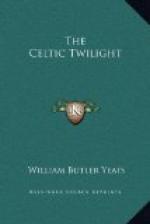Sometimes those who are carried off are allowed after many years— seven usually—a final glimpse of their friends. Many years ago a woman vanished suddenly from a Sligo garden where she was walking with her husband. When her son, who was then a baby, had grown up he received word in some way, not handed down, that his mother was glamoured by faeries, and imprisoned for the time in a house in Glasgow and longing to see him. Glasgow in those days of sailing-ships seemed to the peasant mind almost over the edge of the known world, yet he, being a dutiful son, started away. For a long time he walked the streets of Glasgow; at last down in a cellar he saw his mother working. She was happy, she said, and had the best of good eating, and would he not eat? and therewith laid all kinds of food on the table; but he, knowing well that she was trying to cast on him the glamour by giving him faery food, that she might keep him with her, refused and came home to his people in Sligo.
Some five miles southward of Sligo is a gloomy and tree-bordered pond, a great gathering-place of water-fowl, called, because of its form, the Heart Lake. It is haunted by stranger things than heron, snipe, or wild duck. Out of this lake, as from the white square stone in Ben Bulben, issues an unearthly troop. Once men began to drain it; suddenly one of them raised a cry that he saw his house in flames. They turned round, and every man there saw his own cottage burning. They hurried home to find it was but faery glamour. To this hour on the border of the lake is shown a half-dug trench—the signet of their impiety. A little way from this lake I heard a beautiful and mournful history of faery kidnapping. I heard it from a little old woman in a white cap, who sings to herself in Gaelic, and moves from one foot to the other as though she remembered the dancing of her youth.
A young man going at nightfall to the house of his just married bride, met in the way a jolly company, and with them his bride. They were faeries, and had stolen her as a wife for the chief of their band. To him they seemed only a company of merry mortals. His bride, when she saw her old love, bade him welcome, but was most fearful lest be should eat the faery food, and so be glamoured out of the earth into that bloodless dim nation, wherefore she set him down to play cards with three of the cavalcade; and he played on, realizing nothing until he saw the chief of the band carrying his bride away in his arms. Immediately he started up, and knew that they were faeries; for slowly all that jolly company melted into shadow and night. He hurried to the house of his beloved. As he drew near came to him the cry of the keeners. She had died some time before he came. Some noteless Gaelic poet had made this into a forgotten ballad, some odd verses of which my white-capped friend remembered and sang for me.
Sometimes one hears of stolen people acting as good genii to the living, as in this tale, heard also close by the haunted pond, of John Kirwan of Castle Hacket. The Kirwans[FN#8] are a family much rumoured of in peasant stories, and believed to be the descendants of a man and a spirit. They have ever been famous for beauty, and I have read that the mother of the present Lord Cloncurry was of their tribe.




